Fleurs du Mal Magazine


Or see the index
Weird Westerns is an exploration of the hybrid western genre—an increasingly popular and visible form that mixes western themes, iconography, settings, and conventions with elements drawn from other genres, such as science fiction, horror, and fantasy.
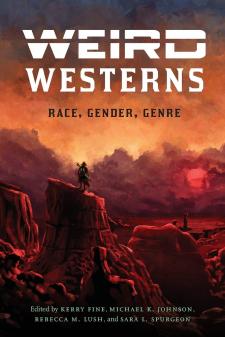 Despite frequent declarations of the western’s death, the genre is now defined in part by its zombie-like ability to survive in American popular culture in weird, reanimated, and reassembled forms.
Despite frequent declarations of the western’s death, the genre is now defined in part by its zombie-like ability to survive in American popular culture in weird, reanimated, and reassembled forms.
The essays in Weird Westerns analyze a wide range of texts, including those by Native American authors Stephen Graham Jones (Blackfeet) and William Sanders (Cherokee); the cult television series Firefly and The Walking Dead; the mainstream feature films Suicide Squad and Django Unchained; the avant-garde and bizarre fiction of Joe R. Lansdale; the tabletop roleplaying game Deadlands: The Weird West; and the comic book series Wynonna Earp.
The essays explore how these weird westerns challenge conventional representations by destabilizing or subverting the centrality of the heterosexual, white, male hero but also often surprisingly reinforce existing paradigms in their inability to imagine an existence outside of colonial frameworks.
Author Bio:
Kerry Fine is an instructor in the Department of English at Arizona State University. Michael K. Johnson is a professor of English at the University of Maine–Farmington. Rebecca M. Lush is an associate professor at California State University, San Marcos. Sara L. Spurgeon is a professor of American literature at Texas Tech University.
Postwestern Horizons:
Postwestern Horizons encourages scholarship which rethinks and reimagines traditional western scholarship by challenging predominant paradigms, including revisionist ones, and dislocating our sense of region. By moving past the West as a national place, process, and idea to more methodologically innovative, transnationally daring, and theoretically fertile horizons of scholarship, this series encourages new ways of conceiving cultural production and reception. Postwestern Horizons encompasses studies of visual culture, environmental studies, literature, history, film studies, and much more.
Weird Westerns
Race, Gender, Genre
Edited by Kerry Fine, Michael K. Johnson, Rebecca M. Lush, and Sara L. Spurgeon
Postwestern Horizons Series
468 pages
Index
Paperback
August 2020
978-1-4962-2178-0
$35.00
Hardcover
August 2020
978-1-4962-2116-2
$70.00
# new books
Weird Westerns.
Race, Gender, Genre
• fleursdumal.nl magazine
More in: - Book News, - Bookstores, Art & Literature News, AUDIO, CINEMA, RADIO & TV, NONFICTION: ESSAYS & STORIES, Western Non-Fiction
“Über Nacht war ich Winnetou!” ist für alle Filmfans ein wahrer Schatz: Drei Jahre nach dem Tod ihres Mannes Pierre Brice zeigt seine Frau Hella das über 50 Jahre lang behütete und zum Großteil unveröffentlichte private Fotomaterial des Winnetou-Schauspielers, entstanden am Rande der Dreharbeiten zu den Winnetou-Filmen.

Ergänzt werden diese Aufnahmen neben zahlreichen weiteren Fotos aus den Winnetou-Filmen unter anderem durch persönliche Briefe, Postkarten, Verträge und Vereinbarungen.
Persönliche Dokumente Pierre Brice’ runden diese einzigartige Sammlung von Memorabilia über einen der beliebtesten und populärsten Schauspieler der letzten 55 Jahre ab.
Pierre-Brice-Edition “Über Nacht war ich Winnetou!”
von Hella Brice
1960er Jahre – Dreharbeiten der Karl-May-Filme. ‘Pierre Brice-Edition’.
Fans von Pierre Brice, Karl May oder Filmen allgemein
Buch (gebunden)
223 Seiten
ISBN: 3780231018
EAN: 9783780231017
21, 4 cm / 30, 2 cm / 2, 0 cm ( B/H/T ).
Karl-May-Verlag
12. Oktober 2018
€ 39,00
# new books
Karl-May-Filme
Pierre Brice-Edition
fleursdumal.nl magazine
More in: - Book News, - Bookstores, Archive A-B, Archive M-N, Art & Literature News, AUDIO, CINEMA, RADIO & TV, Cowboys and Indians, Karl May

The Prairie
The skies are blue above my head,
The prairie green below,
And flickering o’er the tufted grass
The shifting shadows go,
Vague-sailing, where the feathery clouds
Fleck white the tranquil skies,
Black javelins darting where aloft
The whirring pheasant flies.
A glimmering plain in drowsy trance
The dim horizon bounds,
Where all the air is resonant
With sleepy summer sounds,
The life that sings among the flowers,
The lisping of the breeze,
The hot cicala’s sultry cry,
The murmurous dream of bees.
The butterfly a flying flower
Wheels swift in flashing rings,
And flutters round his quiet kin,
With brave flame-mottled wings.
The wild Pinks burst in crimson fire,
The Phlox’ bright clusters shine,
And Prairie-Cups are swinging free
To spill their airy wine.
And lavishly beneath the sun,
In liberal splendor rolled,
The Fennel fills the dipping plain
With floods of flowery gold;
And widely weaves the Iron-Weed
A woof of purple dyes
Where Autumn’s royal feet may tread
When bankrupt Summer flies.
In verdurous tumult far away
The prairie-billows gleam,
Upon their crests in blessing rests
The noontide’s gracious beam.
Low quivering vapors steaming dim
The level splendors break
Where languid Lilies deck the rim
Of some land-circled lake.
Far in the East like low-hung clouds
The waving woodlands lie;
Far in the West the glowing plain
Melts warmly in the sky.
No accent wounds the reverent air,
No footprint dints the sod,-
Lone in the light the prairie lies,
Rapt in a dream of God.
Illinois, 1858
John Hay
(1838-1905)
The Prairie
fleursdumal.nl magazine
More in: Archive G-H, Archive G-H, Natural history, Western Fiction
“Führe dich selbst in eine gute Zukunft. Wie ein guter Häuptling seinen Stamm.” (Frank Behrendt)
 Frank Behrendt ist seit seiner Jugend leidenschaftlicher Winnetou-Fan – der »Guru der Gelassenheit« hat sich in vielen Lebenslagen von dem stolzen Apachen-Häuptling und anderen Figuren des Schriftstellers Karl May inspirieren lassen.
Frank Behrendt ist seit seiner Jugend leidenschaftlicher Winnetou-Fan – der »Guru der Gelassenheit« hat sich in vielen Lebenslagen von dem stolzen Apachen-Häuptling und anderen Figuren des Schriftstellers Karl May inspirieren lassen.
Auch von anderen Persönlichkeiten im echten Leben hat Frank Behrendt viel gelernt. Ihre Haltung, Klugheit und Weisheit hat er übernommen und für seinen eigenen Weg erfolgreich adaptiert. Selbstbestimmt und selbst-entschieden zu leben, tatsächlich Häuptling des eigenen Lebens zu sein, war immer sein Ziel.
In unterhaltsamen Geschichten erzählt Frank Behrendt an konkreten Beispielen, wie ihn die Helden seiner Kindheit nachhaltig beeinflusst haben. Eine Inspiration für jeden und ein flammender Appell an alle, Ausschau zu halten nach den Helden am Wegesrand – den fiktionalen und den realen.
Frank Behrendt, geb. 1963, ist seit gut 20 Jahren ausgewiesener PR- und Kommunikationsfachmann mit intensiven Kontakten zu Medien, Wirtschaft und Politik. Nach Stationen bei BILD, Dornier, Henkel, RTL Television und Universal Music war der Absolvent der Deutschen Journalistenschule in München Deutschland-Chef bei KetchumPleon, bevor er 2011 als Vorstand zur fischerAppelt AG wechselte. Seit Februar 2017 ist er in der Serviceplan-Gruppe tätig. Im März 2017 wurde er von der Deutschen Public Relations Gesellschaft (DPRG) als “PR-Kopf des Jahres” ausgezeichnet. Frank Behrendt lebt mit seiner Frau und seinen drei Kindern in Köln.
Frank Behrendt
Die Winnetou-Strategie Werde zum Häuptling deines Lebens
Seitenzahl: 221
Oktober 2017
Deutsch
Abmessung: 218mm x 139mm x 25mm
Gebundenes Buch mit Schutzumschlag
ISBN-13: 9783579086811
ISBN-10: 3579086812
Verlag: Gütersloher Verlagshaus
fleursdumal.nl magazine
More in: - Book News, - Bookstores, Archive A-B, Archive M-N, Archive W-X, Art & Literature News, Cowboys and Indians, Karl May

Karl May
(1842-1912)
Mein Liebchen
Wenn Sorge mich und Unmuth quälet,
Wenn mir’s an Moos im Beutel fehlet,
Wenn mich ein schwerer Kummer drückt,
Das Schicksal mich mit Pech beglückt:
Was ist es dann, wonach ich greife?
I nun! Die liebe Tabakspfeife!
Bei meinen Freuden, meinen Scherzen,
Beim Austausch gleichgesinnter Herzen,
In all’ den traulich frohen Stunden,
Die ich im Freundeskreis gefunden,
Bei meines Glück’s so seltner Reife
Ist stets um mich die liebe Pfeife.
Auf all’ den Reisen, die ich machte,
Wo die Natur mir freundlich lachte,
Auf all’ den einsam trauten Wegen,
Im Waldesgrün, wo ich gelegen,
In Feld und Flur, die ich durchstreife,
Begleitet mich die treue Pfeife.
Sie bleibt mir Braut durch’s ganze Leben;
Ja, sie in Adel zu erheben
Ist wohl ein Leichtes: Das Diplom
Schreibt sie sich selbst durch ihr Arom.
Sie heiße d’rum, ob man auch keife,
Von jetzt an: Edle von der Pfeife!
Karl May poetry
fleursdumal.nl magazine
More in: Archive M-N, Karl May
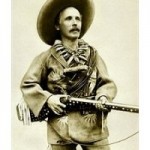
Karl May
(1842-1912)
Trost
Horch, klopfte es nicht an die Pforte?
Wer naht, von Himmelsduft umrauscht?
Woher des Trostes süße Worte,
Auf die mein Herz voll Andacht lauscht?
Wer neigt, wenn alle Sterne sanken,
Mit mildem Licht und stiller Huld
Sich zu dem Staub- und Erdenkranken?
Es ist der Engel der Geduld.
»O laß den Gram nicht mächtig werden,
Du tiefbetrübtes Menschenkind!
Wiß’, daß die Leiden dieser Erden
Des Himmels beste Gaben sind
Und daß, wenn Sorgen Dich umwogen
Und Dich umhüllt des Zweifels Nacht,
Dort an dem glanzumfloss’nen Bogen
Ein treues Vaterauge wacht!«
»O laß Dir nicht zu Herzen steigen
Die langverhaltne Thränenfluth!
Wiß, daß grad in den schmerzensreichen
Geschicken tiefe Weisheit ruht,
Und daß, wenn sonst Dir Nichts verbliebe,
Die Hoffnung doch Dir immer lacht,
Da über Dich in ew’ger Liebe
Ein treues Vaterauge wacht!«
»O wolle nie Dich einsam fühlen!
Obgleich kein Aug’ sie wandeln sah,
Die sorgenheiße Stirn zu kühlen
Sind Himmelsboten immer da.
Wer gern dem eignen Herzen glaubte,
Der kennt des Pulses heilige Macht.
Drum wiß, das über Deinem Haupte
Ein treues Vaterauge wacht!«
»Drum füge Dich in Gottes Walten
Und trag Dein Leid getrost und still.
Es muß im Dunkel sich gestalten,
Was er zum Lichte führen will.
Dann bringt der Glaube reichen Segen,
Ob ihn der Zweifler auch verlacht,
Daß über allen Deinen Wegen
Ein treues Vaterauge wacht!«
Karl May poetry
fleursdumal.nl magazine
More in: Archive M-N, Karl May
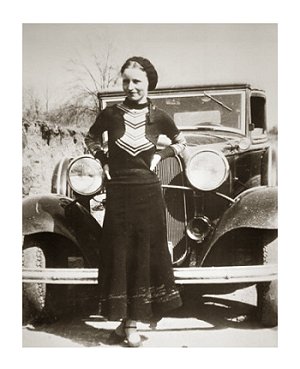
Bonnie Elizabeth Parker
(1910 – 1934)
The story of “Suicide Sal”
We each of us have a good “alibi”
For being down here in the “joint”
But few of them really are justified
If you get right down to the point.
You’ve heard of a woman’s glory
Being spent on a “downright cur”
Still you can’t always judge the story
As true, being told by her.
As long as I’ve stayed on this “island”
And heard “confidence tales” from each “gal”
Only one seemed interesting and truthful-
The story of “Suicide Sal”.
Now “Sal” was a gal of rare beauty,
Though her features were coarse and tough;
She never once faltered from duty
To play on the “up and up”.
“Sal” told me this tale on the evening
Before she was turned out “free”
And I’ll do my best to relate it
Just as she told it to me:
I was born on a ranch in Wyoming;
Not treated like Helen of Troy,
I was taught that “rods were rulers”
And “ranked” as a greasy cowboy.
Then I left my old home for the city
To play in its mad dizzy whirl,
Not knowing how little of pity
It holds for a country girl.
There I fell for “the line” of a “henchman”
A “professional killer” from “Chi”
I couldn’t help loving him madly,
For him even I would die.
One year we were desperately happy
Our “ill gotten gains” we spent free,
I was taught the ways of the “underworld”
Jack was just like a “god” to me.
I got on the “F.B.A.” payroll
To get the “inside lay” of the “job”
The bank was “turning big money”!
It looked like a “cinch for the mob”.
Eighty grand without even a “rumble”-
Jack was last with the “loot” in the door,
When the “teller” dead-aimed a revolver
From where they forced him to lie on the floor.
I knew I had only a moment-
He would surely get Jack as he ran,
So I “staged” a “big fade out” beside him
And knocked the forty-five out of his hand.
They “rapped me down big” at the station,
And informed me that I’d get the blame
For the “dramatic stunt” pulled on the “teller”
Looked to them, too much like a “game”.
The “police” called it a “frame-up”
Said it was an “inside job”
But I steadily denied any knowledge
Or dealings with “underworld mobs”.
The “gang” hired a couple of lawyers,
The best “fixers” in any mans town,
But it takes more than lawyers and money
When Uncle Sam starts “shaking you down”.
I was charged as a “scion of gangland”
And tried for my wages of sin,
The “dirty dozen” found me guilty-
From five to fifty years in the pen.
I took the “rap” like good people,
And never one “squawk” did I make
Jack “dropped himself” on the promise
That we make a “sensational break”.
Well, to shorten a sad lengthy story,
Five years have gone over my head
Without even so much as a letter-
At first I thought he was dead.
But not long ago I discovered;
From a gal in the joint named Lyle,
That Jack and his “moll” had “got over”
And were living in true “gangster style”.
If he had returned to me sometime,
Though he hadn’t a cent to give
I’d forget all the hell that he’s caused me,
And love him as long as I lived.
But there’s no chance of his ever coming,
For he and his moll have no fears
But that I will die in this prison,
Or “flatten” this fifty years.
Tommorow I’ll be on the “outside”
And I’ll “drop myself” on it today,
I’ll “bump ’em if they give me the “hotsquat”
On this island out here in the bay…
The iron doors swung wide next morning
For a gruesome woman of waste,
Who at last had a chance to “fix it”
Murder showed in her cynical face.
Not long ago I read in the paper
That a gal on the East Side got “hot”
And when the smoke finally retreated,
Two of gangdom were found “on the spot”.
It related the colorful story
Of a “jilted gangster gal”
Two days later, a “sub-gun” ended
The story of “Suicide Sal”.
Bonnie Elizabeth Parker (October 1, 1910 – May 23, 1934) and Clyde Chestnut Barrow (March 24, 1909 – May 23, 1934) were well-known (as Bonnie & Clyde) American outlaws and bankrobbers. They were both killed in a police ambush on May 23, 1934. Bonnie Parker wrote most of her poems, while in jail, in a little notebook she had obtained from The First National Bank of Burkburnett, Texas.
Bonnie Parker poetry
fleursdumal.nl magazine
More in: Archive O-P, Archive O-P, Bonnie and Clyde, Bonnie Parker, CRIME & PUNISHMENT, Suicide, Western Fiction
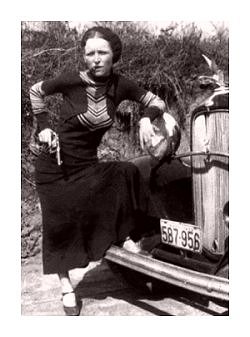
Bonnie Elizabeth Parker
(1910 – 1934)
The trail’s end
You’ve read the story of Jesse James
of how he lived and died.
If you’re still in need;
of something to read,
here’s the story of Bonnie and Clyde.
Now Bonnie and Clyde are the Barrow gang
I’m sure you all have read.
how they rob and steal;
and those who squeal,
are usually found dying or dead.
There’s lots of untruths to these write-ups;
they’re not as ruthless as that.
their nature is raw;
they hate all the law,
the stool pigeons, spotters and rats.
They call them cold-blooded killers
they say they are heartless and mean.
But I say this with pride
that I once knew Clyde,
when he was honest and upright and clean.
But the law fooled around;
kept taking him down,
and locking him up in a cell.
Till he said to me;
“I’ll never be free,
so I’ll meet a few of them in hell”
The road was so dimly lighted
there were no highway signs to guide.
But they made up their minds;
if all roads were blind,
they wouldn’t give up till they died.
The road gets dimmer and dimmer
sometimes you can hardly see.
But it’s fight man to man
and do all you can,
for they know they can never be free.
From heart-break some people have suffered
from weariness some people have died.
But take it all in all;
our troubles are small,
till we get like Bonnie and Clyde.
If a policeman is killed in Dallas
and they have no clue or guide.
If they can’t find a fiend,
they just wipe their slate clean
and hang it on Bonnie and Clyde.
There’s two crimes committed in America
not accredited to the Barrow mob.
They had no hand;
in the kidnap demand,
nor the Kansas City Depot job.
A newsboy once said to his buddy;
“I wish old Clyde would get jumped.
In these awfull hard times;
we’d make a few dimes,
if five or six cops would get bumped”
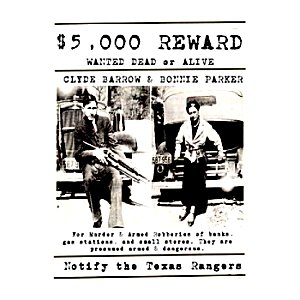
The police haven’t got the report yet
but Clyde called me up today.
He said,”Don’t start any fights;
we aren’t working nights,
we’re joining the NRA.”
From Irving to West Dallas viaduct
is known as the Great Divide.
Where the women are kin;
and the men are men,
and they won’t “stool” on Bonnie and Clyde.
If they try to act like citizens
and rent them a nice little flat.
About the third night;
they’re invited to fight,
by a sub-gun’s rat-tat-tat.
They don’t think they’re too smart or desperate
they know that the law always wins.
They’ve been shot at before;
but they do not ignore,
that death is the wages of sin.
Some day they’ll go down together
they’ll bury them side by side.
To few it’ll be grief,
to the law a relief
but it’s death for Bonnie and Clyde.
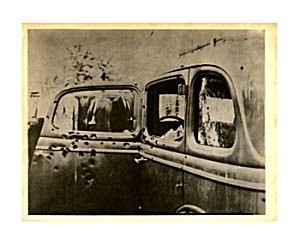
A few weeks before Bonny Parker was killed by 26 bullets from the police, she wrote this poem which she sent to her mother.
Bonnie Parker poetry
• fleursdumal.nl magazine
More in: #Editors Choice Archiv, Archive O-P, Archive O-P, Bonnie and Clyde, Bonnie Parker, CRIME & PUNISHMENT, Western Fiction
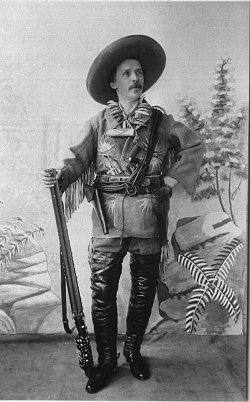
Karl May
(1842-1912)
Trost
Horch, klopfte es nicht an die Pforte?
Wer naht, von Himmelsduft umrauscht?
Woher des Trostes süße Worte,
Auf die mein Herz voll Andacht lauscht?
Wer neigt, wenn alle Sterne sanken,
Mit mildem Licht und stiller Huld
Sich zu dem Staub- und Erdenkranken?
Es ist der Engel der Geduld.
»O laß den Gram nicht mächtig werden,
Du tiefbetrübtes Menschenkind!
Wiß’, daß die Leiden dieser Erden
Des Himmels beste Gaben sind
Und daß, wenn Sorgen Dich umwogen
Und Dich umhüllt des Zweifels Nacht,
Dort an dem glanzumfloss’nen Bogen
Ein treues Vaterauge wacht!«
»O laß Dir nicht zu Herzen steigen
Die langverhaltne Thränenfluth!
Wiß, daß grad in den schmerzensreichen
Geschicken tiefe Weisheit ruht,
Und daß, wenn sonst Dir Nichts verbliebe,
Die Hoffnung doch Dir immer lacht,
Da über Dich in ew’ger Liebe
Ein treues Vaterauge wacht!«
»O wolle nie Dich einsam fühlen!
Obgleich kein Aug’ sie wandeln sah,
Die sorgenheiße Stirn zu kühlen
Sind Himmelsboten immer da.
Wer gern dem eignen Herzen glaubte,
Der kennt des Pulses heilige Macht.
Drum wiß, das über Deinem Haupte
Ein treues Vaterauge wacht!«
»Drum füge Dich in Gottes Walten
Und trag Dein Leid getrost und still.
Es muß im Dunkel sich gestalten,
Was er zum Lichte führen will.
Dann bringt der Glaube reichen Segen,
Ob ihn der Zweifler auch verlacht,
Daß über allen Deinen Wegen
Ein treues Vaterauge wacht!«
Karl May poetry
fleursdumal.nl magazine
More in: Archive M-N, Karl May
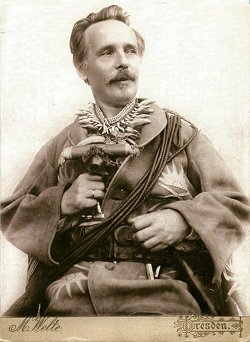
Karl May
(1842-1912)
Mein Liebchen
Wenn Sorge mich und Unmuth quälet,
Wenn mir’s an Moos im Beutel fehlet,
Wenn mich ein schwerer Kummer drückt,
Das Schicksal mich mit Pech beglückt:
Was ist es dann, wonach ich greife?
I nun! Die liebe Tabakspfeife!
Bei meinen Freuden, meinen Scherzen,
Beim Austausch gleichgesinnter Herzen,
In all’ den traulich frohen Stunden,
Die ich im Freundeskreis gefunden,
Bei meines Glück’s so seltner Reife
Ist stets um mich die liebe Pfeife.
Auf all’ den Reisen, die ich machte,
Wo die Natur mir freundlich lachte,
Auf all’ den einsam trauten Wegen,
Im Waldesgrün, wo ich gelegen,
In Feld und Flur, die ich durchstreife,
Begleitet mich die treue Pfeife.
Sie bleibt mir Braut durch’s ganze Leben;
Ja, sie in Adel zu erheben
Ist wohl ein Leichtes: Das Diplom
Schreibt sie sich selbst durch ihr Arom.
Sie heiße d’rum, ob man auch keife,
Von jetzt an: Edle von der Pfeife!
Karl May poetry
fleursdumal.nl magazine
More in: Archive M-N, Karl May
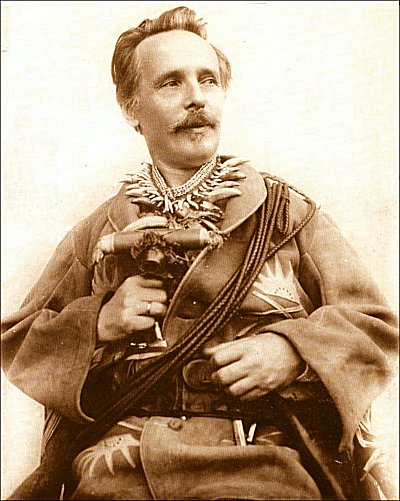
Karl May
(1842-1912)
Die wilde Rose
Es glänzt der helle Thränenthau
In Deinem Kelch, dem todesmatten;
Du sehnst Dich nach des Himmels Blau
Hinaus aus düstrem Waldesschatten.
Es rauscht der Bach am Felsenspalt
Sein melancholisch Lied.
Hier ists so eng, hier ists so kalt,
Wo nie der Nebel flieht.
Du meine süße Himmelslust,
O traure nicht und laß das Weinen!
Dir soll ja stets an treuer Brust
Die Sonne meiner Liebe scheinen.
Drum schließe Deine Augen zu,
Worin die Thränen glühn.
Ja, meine wilde Rose, Du
Sollst nicht im Wald verblühn!
Karl May Gedicht: Die wilde Rose
• fleursdumal.nl magazine
More in: Archive M-N, Archive M-N, Karl May
Thank you for reading Fleurs du Mal - magazine for art & literature